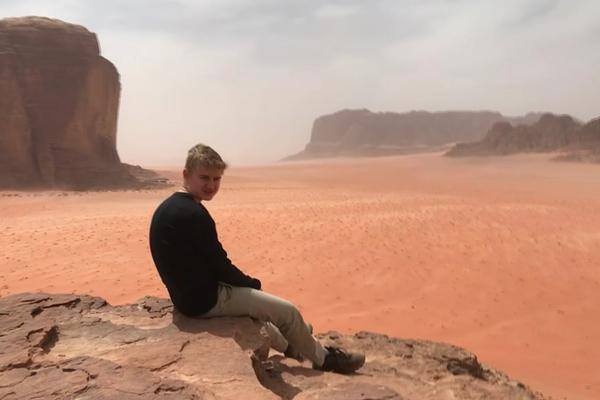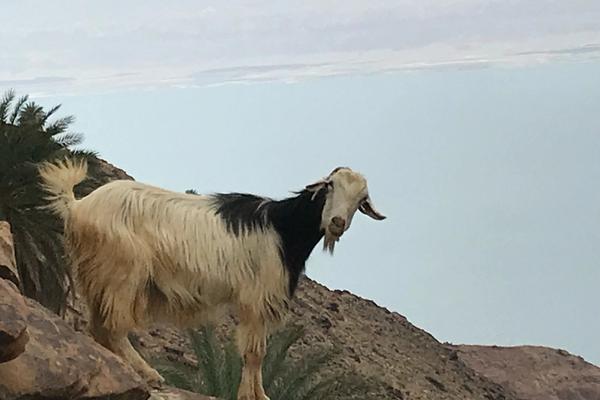Into Amman
What makes the desert beautiful is that somewhere it hides a well - Antoine de Saint-Exupery
We leave the airport and are immediately swept onto the bustling highway in our rented car. It's evening, and everything is just as I imagined it would be.
Cypress trees line the roadsides, the warm air is heavy with the smell of gasoline, and drivers apply their own creative interpretation of the rules of the road.
Our hotel, perched near the Grand Husseini Mosque, gives us a clear view of its towering minarets. The morning prayer call wakes us up before the sun does.
Lamb mansaf
Somewhere in the hills, we stop at a small, unassuming restaurant. Like the shameless tourist I am, I order Jordan’s national dish: mansaf. The plate arrives, laden with lamb, rice, and yogurt sauce.
Mansaf is simply one of the best meals I've ever had. That's all there is to say.
Desolace at Petra
We climb up to the plateau above the main structure in Petra, passing a few confused Bedouins on the way up. Tourists, like myself, apparently don't frequent the area. I'm not sure whether I should take this as a sign of caution, or a sign of privilege.
When we get to the top, I feel complete silence. Some sort of stillness, not just quiet — almost like this is the end of the Earth.
When I look right, the plateau continues. To the left, I see a Bedouin tent structure and people cooking within. Behind me, the jagged rock path I came from. In front of me, something extraordinary.
Nothing. I see nothing. There is rock and sky and nothing else. It’s rare that you're able to look at something so vast and untouched. Brutal, barren, and beautiful. This feeling, simultaneously desolate and vibrant, has stuck with me.
Universal problems
In the distance, a couple appears. Like a movie — the heat rises from the rock and sand, the sun beams down, and the silhouettes slink towards me.
One of the people splits off and calls to me and my Dad. She asks if she can pretend to be part of our family, and for good reason. The other man who I had mistaken as a spouse is following her, harassing her.
Perhaps he has no true intention of doing anything grim, but what if he does? From her perspective, what can you possibly do if you run into a stranger on the plateau?
The man, following about twenty paces behind, sees us talking and seemed to lose interest.
Most of the Bedouins inside their homes, and most of the tourists are walking through the Siq below. Up here, we're mostly alone.
Pavlov goats
Taking respite under a cave canopy, we start eating our packed lunch. The heat is ramping up. The lunch isn't great, but we're both extremely hungry.
The goats are hungry too.
We hear bells in the distance, getting closer and closer as we scarf down our meals. Soon, the bells are around the corner. We see a small goat peek from around the corner, and within a second there are at least twelve goats coming towards us.
They stop about six feet away from us, and we promptly shoo them away whenever they inch closer. This doesn't stop them from leaving. We give them scraps to enjoy, and take satisfaction in watching the goats eat a good lunch. After all, goats are kind of cute, and we can't help it.
Al-Karak
On the King's Highway, we stop at a castle: Al-Karak (or Kerak Castle). Constructed during the crusades, this large medieval castle sits on top of a tall hill.
The place had actually been the site of a shootout with extremists, but we didn't know that at the time. And I say that we didn't know thankfully, because otherwise we wouldn't have experienced it.
We make our way through the entire castle, observing the slots made for archers to defend from incoming invaders. On the way out, we see an old man with a cane approaching us. Without uttering a word, he points out some of the features in the structure above, looking back at us to see if we're following.
Given that we've already gone through the castle (and the fact that I hate tours), I suggest we leave.
My Dad respects the old man's hustle and says we should stay. This is something that I've always admired about him: he is open to seeing the same thing in a different way, and he notices opportunities where most would turn away.
The man speaks some English with us, but we mainly rely on Google Translate. Our Arabic is not good, and I suppose that's okay.
We see areas of the castle we missed the first time. We take some photos together, pay the man and thank him as we walk back over the moat.
On the way to our car, the vendors who gave us a place to park tell us the recommended "donation" for their service.
"Five, tenty... twenty?". We haggled a bit, paid $10 ("tenty") and they threw in some water and snacks.
Towards the desert
We drive towards Aqaba, the only coast that Jordan has. The range rises and falls and we pass through various checkpoints along the way. Looking around, the scenery really does look like something pulled from the Bible, or a picture in a textbook on some Mesopotamian lands. Rumbling desert hills that lead down to cultivated crops and small oases.
Once in Aqaba, we spend some time walking around but quickly realize that there's not much to do here. You can scuba and eat food, but that's about it.
We've heard about the Wadi Rum desert nearby and decide to schedule a camel trek. This is one of the best decisions we will make on this trip.
Camel jockeys
The sand is literally red, pictures cannot capture it. I’m hanging out with a local in Wadi Rum, a desert. This guy has an Android and excellent cell service in the middle of nowhere. He’s showing me a video of a camel race in the UAE, and tells me about how a certain Sheikh had come to buy one recently. The proceeds go to the local settlements, whose business is raising camels.
He explains to me briefly what makes a good camel and a bad camel (“thalul”) — weight, chest size, hooves. In the video, I see camels running against one another, and people riding in expensive cars alongside the track. Hanging out the windows of their G-Wagons and Range Rovers, very wealthy Arab businessmen and royals egg on their prize camels.
Lost in the desert
During a small trek into the desert with my Dad, we almost get lost. We enter into the canyon and can't quite find our way out now. Twists and turns blend into one another, and everything looks similar.
Small, often indistinguishable variations on red rock and sand are what make up the desert and slot canyons. These small winding valleys are a refuge from the sun. The formations themselves are all unique, yet simultaneously indistinguishable. It's easy to get lost.
I'm dumb and dehydrated.

Thieving goats
When we get to Khirbet al-Mukhayyat, we park our car to take a hike on the mountainside. During our hike we come across a herd of goats that walk adjacent to us, and a herder up above.
The hike is fairly diverse: rocky hillside, swamp, with some fields and foliage in between. The winding turns and switchbacks carry us back and forth.
A particularly charismatic goat greets us from above, bleating at us in his goat tongue. We try to bleat back, but I don't think he understands us.

When we get back to our car, we're surprised to see the windows to our car are broken. Looking inside, many of our belongings are still there - thankfully we hadn't left too much inside. The one thing that is actually missing: my headphones. Too bad they didn't take the cord - no music for thieves I guess.
Maybe the goat did it.
